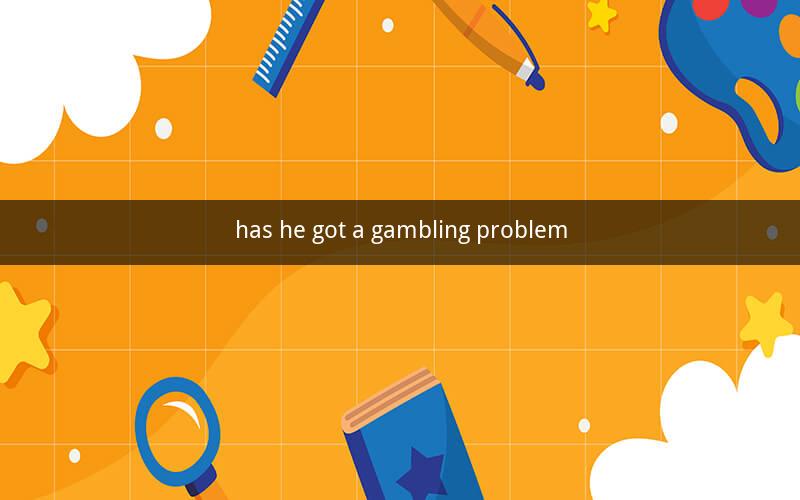
Table of Contents
1. Introduction to Gambling Problems
2. Identifying Signs of a Gambling Problem
3. The Impact of Gambling on Mental Health
4. The Role of Family and Friends in Recognizing a Problem
5. Professional Help and Support for Gambling Addiction
6. The Legal and Social Consequences of Problem Gambling
7. Prevention and Education on Responsible Gambling
8. Case Studies and Personal Stories
9. Conclusion
1. Introduction to Gambling Problems
Gambling has been a part of human culture for centuries, with various forms of betting and gaming available across the globe. While many individuals enjoy gambling as a form of entertainment, it can become a significant problem for others. The question of whether someone has a gambling problem is often complex and multifaceted.
2. Identifying Signs of a Gambling Problem
Recognizing the signs of a gambling problem is crucial for early intervention and support. Common indicators include:
- Preoccupation with gambling, often at the expense of other responsibilities and interests.
- Inability to control the urge to gamble, even when it causes financial, emotional, or relationship problems.
- Lying to hide gambling activities from family and friends.
- Borrowing money or selling possessions to fund gambling habits.
- Feeling restless or irritable when unable to gamble.
3. The Impact of Gambling on Mental Health
Gambling problems can have severe consequences on mental health, leading to conditions such as depression, anxiety, and substance abuse. The stress of financial difficulties and the emotional turmoil associated with gambling can exacerbate existing mental health issues or lead to new ones.
4. The Role of Family and Friends in Recognizing a Problem
Family and friends are often the first to notice the signs of a gambling problem. It is essential for them to approach the situation with empathy and support. Encouraging the individual to seek help and providing a non-judgmental environment can be crucial in the recovery process.
5. Professional Help and Support for Gambling Addiction
Professional help is essential for individuals struggling with gambling addiction. Therapies such as cognitive-behavioral therapy (CBT) and support groups can provide the tools and resources needed to overcome addiction. Additionally, some individuals may benefit from medication to manage co-occurring mental health issues.
6. The Legal and Social Consequences of Problem Gambling
Problem gambling can have significant legal and social consequences. Financial difficulties, legal problems, and strained relationships with family and friends are common outcomes. Recognizing and addressing the problem can help mitigate these consequences.
7. Prevention and Education on Responsible Gambling
Preventing gambling problems starts with education and awareness. Responsible gambling programs and resources can help individuals make informed decisions about their gambling habits. By promoting responsible gambling, we can reduce the risk of developing a gambling problem.
8. Case Studies and Personal Stories
Personal stories and case studies provide valuable insights into the experiences of individuals struggling with gambling addiction. These stories can help raise awareness and inspire hope for those affected by this issue.
9. Conclusion
Gambling problems can have a profound impact on individuals, families, and communities. By recognizing the signs of a problem, seeking help, and promoting responsible gambling, we can work towards a healthier and more informed society.
Questions and Answers
1. What are the main signs of a gambling problem?
- Preoccupation with gambling, inability to control the urge to gamble, lying to hide gambling activities, borrowing money to fund gambling, and feeling restless or irritable when unable to gamble.
2. How can family and friends support someone with a gambling problem?
- By approaching the situation with empathy, encouraging the individual to seek help, and providing a non-judgmental environment.
3. What types of therapy are available for gambling addiction?
- Cognitive-behavioral therapy (CBT), support groups, and medication for co-occurring mental health issues.
4. What are the legal consequences of problem gambling?
- Financial difficulties, legal problems, and strained relationships with family and friends.
5. How can responsible gambling be promoted?
- Through education, awareness, and responsible gambling programs.
6. What are some common triggers for gambling addiction?
- Stress, boredom, and the need for excitement or thrill.
7. How can individuals overcome a gambling addiction?
- By seeking help, joining support groups, and developing healthy coping mechanisms.
8. What is the role of technology in promoting gambling addiction?
- Technology can make gambling more accessible, leading to increased risk of addiction.
9. How can employers help employees with gambling problems?
- By providing resources, support, and confidential assistance.
10. What is the most effective way to prevent gambling addiction?
- By promoting responsible gambling, raising awareness, and providing education on the risks associated with gambling.